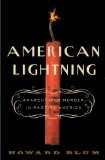Summary | Excerpt | Reviews | Beyond the Book | Readalikes | Genres & Themes | Author Bio
Terror, Mystery, the Birth of Hollywood, and the Crime of the Century
by Howard Blum

Critics' Opinion:
Readers' Opinion:
First Published:
Sep 2008, 352 pages
Paperback:
Oct 2009, 352 pages
 Book Reviewed by:
Book Reviewed by:
Jamie Kuhns
Buy This Book
In opposition, capitalists formed militant associations, organizations that were empowered by immense wealth, reinforced by private armies of goons, corrupt police, and hired detectives. They were led by men certain that material success was tangible proof of moral superiority. The associations held that profit must be maximized regardless of the human cost or suffering, and that no union man should be employed.
The nation was locked in an intense struggle over its future and over the quality of American life and justice. But nowhere in the country did the opposing armies of unions and employers collide with greater frequency than in Los Angeles. In the first decade of the twentieth century, the city had become “the bloodiest arena in the Western World for Capital and Labor.”
This long-running confrontation was largely provoked by the sentiments, leadership, and intransigence of one belligerent and self- confident individual—Harrison Gray Otis.
Otis’s was, in its meandering, unpredictable way, a typical California success story. He had come to California in 1880, at the age of forty-two, with no more specific ambition than to start over in the bright sunshine. He had been a hero in the Civil War, enlisting in his native Ohio as a Union private, and had risen, after fifteen battles and several wounds, to the rank of captain. But he had had no success in civilian life. His warrior’s temperament had difficulty adjusting to the succession of menial jobs that came his way—clerk in the Ohio House of Representatives, and then a compositor, later a foreman, in the Government Printing Office. In desperation, he found a position as treasury agent of the Seal Islands in the Bering Sea. With only his wife Eliza for company, he endured a period of detachment and exile. A mountain of a man with a walrus mustache and a wild goatee, bristling with an instinctive aggressiveness, even his speaking voice a thunderous boom, Otis felt caged, his vitality drained, by his life in these bleak, barren islands. He served his three years and then headed to southern California, eager to pursue the vague yet restorative promise in endless blue skies and warm days.
At first Otis maneuvered to become collector of the Port of San Diego, but when this did not come to fruition, he tried something else. He raised Angora goats. A shepherd’s life, however, did not suit the personality of a man who needed a more responsive audience. Once again he soon found himself grasping after something new. As a teenager he had worked in an Ohio printer’s shop, and the experience was sufficient qualification to land him the editor’s position at the Santa Barbara Press. Santa Barbara was a bucolic coastal village of two thousand, and the weekly published a folksy brand of neighborhood journalism. Otis enjoyed the work, but when Los Angeles’s newest paper, the Daily Times, offered him a job writing editorials for a comparatively bountiful fifteen dollars a week, Otis, in his restless way, decided to accept.
He had not been at the Times very long before it became apparent that the paper was on the verge of bankruptcy. Unless investors could be found, it would cease publication. Otis was forty-four years old, and as he confided to his wife, he had come to the realization that he was running out of chances. Other considerations also had him thinking: His ego had taken to the power and posturing that comes with newspapering; and his instinct alerted him to a day when Los Angeles, although only a drab mud and adobe town of 11,000, would glisten with the shine of opportunity. Otis set out to raise the money needed to keep the Times going. When he succeeded, he was rewarded with a quarter interest in the struggling paper. Four years later, in 1886, he acquired total control. Otis was now sole owner, publisher, and editor in chief. He could run the Times as he saw fit, and unencumbered by either doubts or hesitations, he did. As the city boomed, Otis transformed the Times not only into a commercial success but also into a fiercely conservative, anti-union journal.
Excerpted from American Lightning by Howard Blum. Excerpted by permission of Crown, a division of Random House, Inc. All rights reserved. No part of this excerpt may be reproduced or reprinted without permission in writing from the publisher.





The Funeral Cryer by Wenyan Lu
Debut novelist Wenyan Lu brings us this witty yet profound story about one woman's midlife reawakening in contemporary rural China.
Your guide toexceptional books
BookBrowse seeks out and recommends the best in contemporary fiction and nonfiction—books that not only engage and entertain but also deepen our understanding of ourselves and the world around us.